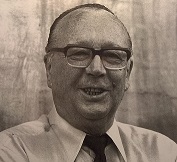Dr. Erich Pultar

Personalia
Born:
Died:
Profession:
Persecution:
Imprisonment 13.03.1938 - 01.04.1938,
Dachau concentration camp 01.04.1938 - 20.09.1938,
Released in 1938,
Resistance fighter (undiscovered)
KZ Number:
Memberships
Curriculum Vitae
Erich Pultar studied law at the University of Vienna after graduating from the Realgymnasium in Vienna 21 in 1928. He joined the Norica student fraternity in 1928. He completed his studies in 1935 with a doctorate in law, after which he worked as a concept officer for the City of Vienna.
After the Anschluss, he was arrested together with his brother Walter on March 13, 1938 and transferred with him on April 1, 1938 to the Dachau concentration camp on the first transport from Austria, also known as the "Prominent Transport", along with 15 other CVers. Pultar reports:
"...Then in the evening [of March 30] they beat us down the stairs into a prison van that took us to the Westbahn. There were not only policemen with armbands there, but also other Nazis. [...] In the wagons we had to keep our hands on our knees, sit up straight, look straight ahead, not close our eyes, not even lean backwards. An SS man stood in the open doorway. If someone showed signs of fatigue, he was brought back to life with the butt of a rifle. [
On arrival in Dachau, one after the other had to line up, and before you could even get down the stairs, an SS man kicked you in the ass so that you flew off the wagon."
After his release on 20 September 1938, Erich Pultar initially worked as an accountant in a petrol company. At the same time, the Noricers Alfred Benn and Ferdinand Thaller as well as the CVers Eduard Geyer, Julius Kallus, Anton Pilat and the former rector of the Hochschule für Welthandel Prof. Dr. Emmerich Zederbauer are dismissed. In July 1940, Erich Pultar enlists in the German Wehrmacht. He becomes a member of the resistance group "Christlich deutsche Turnerschaft, Leiter Winter".
"I was never interrogated, not even in Dachau. [...] My brother-in-law had a schoolmate [...] who was in the Gestapo. He then found out that my police file said: 'Member of the Fatherland Front. Fanatical opponent of National Socialism.'" - recalls Erich Pultar.
Citations
Krause, Peter/Reinelt, Herbert/Schmitt, Helmut (2020): Farbe tragen, Farbe bekennen. Katholische Korporierte in Widerstand und Verfolgung. Teil 2. Kuhl, Manfred (ÖVfStG, Wien) S. 264/265.
